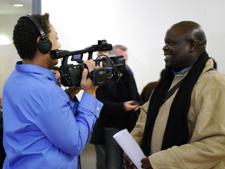Xtra.ca reporter Ryan Carter attended a meeting in protest of Uganda’s anti-gay bill at The 519 Community Centre in Toronto.
George Ssemukuutu (pictured at right) is chair of Toronto’s Pride Uganda group. He moderated the Dec 18 event, which included speeches from politicians, activists and queer Africans living in Toronto.
Watch the report below:
Under Uganda’s proposed anti-gay law, simply “promoting” homosexuality is punishable with five to seven years in prison. Ssemukuutu says that was on his mind as he organized the Toronto meeting, because the proposed law even applies to “offences” committed outside Uganda.
Among the other punishments listed in the draft bill: a death penalty for “aggravated homosexuality,” life in prison for gay sex and three years in prison for anyone who fails to report gays to the police.
Ssemukuutu says he approached queer Ugandans to speak at the Toronto meeting, but some were too afraid to attend.
“The bill itself was so frightening for some. Many of them are concerned for their relatives,” said Ssemukuutu. “We don’t all get on well with our relatives and parents because of who we are, but it doesn’t mean we are detached from them. The consequences are very severe.”
Despite those fears, activists vowed to not back down.
“The activism we do as queer Africans… we’re putting our lives at risk,” said Notisha Massaquoi, executive director of Women’s Health in Women’s Hands. “But I’m also very aware of my privilege standing within Canadian borders. It’s that privilege I need to draw on to provide support.
“I’m imploring — especially Africans in this city, especially the queer Africans in this room — this is not the time for us to hide.”
The event, which was billed as a vigil and protest, felt more like a community meeting as more than 100 people sat in chairs, listening to nearly two hours of speeches by politicians, political candidates and activists.
With representatives from the Liberals, NDP and Greens in attendance, there was a noticeable absence: no Conservatives.
The feds put out a press release on Dec 11 urging Uganda to reconsider its anti-gay bill. That’s not good enough, said some of the speakers.
“Our government can say nothing more than put out a semi-pleasing press-release and has none of the courage or chutzpah required to take these on and to start to value these lives somewhat more equally,” said Glen Murray, who is running for the Toronto Centre federal Liberal nomination.
At a November Commonwealth meeting, Prime Minister Stephen Harper reportedly met with the Ugandan president to privately discuss the bill. Gay Liberal MP Mario Silva said the PM needs to do more, suggesting that Uganda should be removed from the Commonwealth if the bill passes.
“I don’t know how [Harper] raised the issue with the Ugandan president when he in Canada can never once say publicly that there are gays and lesbians even in this country,” said Silva.
Activist El-Farouk Khaki capped off the night as one of the final speakers. He noted that the bill will introduce a death penalty for anyone living with HIV who is convicted of “aggravated homosexuality.”
“This is taking the step of controlling our bodies that much further,” said Khaki. “It not only criminalizes and stigmatizes queers, but it absolutely furthers HIV and AIDS stigma. We can’t forget that. It’s been mentioned only once tonight.”
Pride Uganda is planning a Toronto fundraiser on Jan 23. More details will be posted on Xtra.ca as they become available.
Video by Ryan Carter.

 Why you can trust Xtra
Why you can trust Xtra


